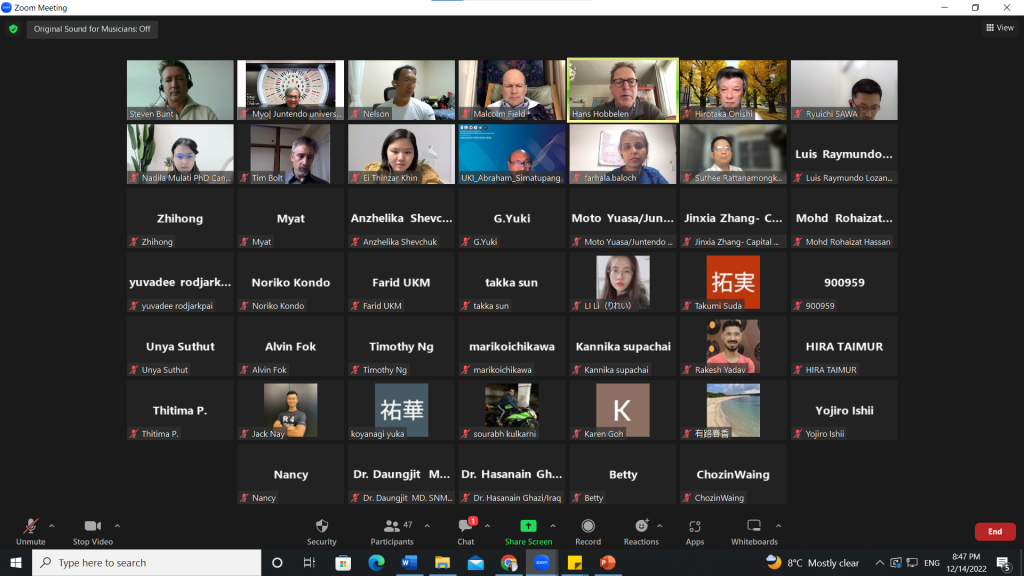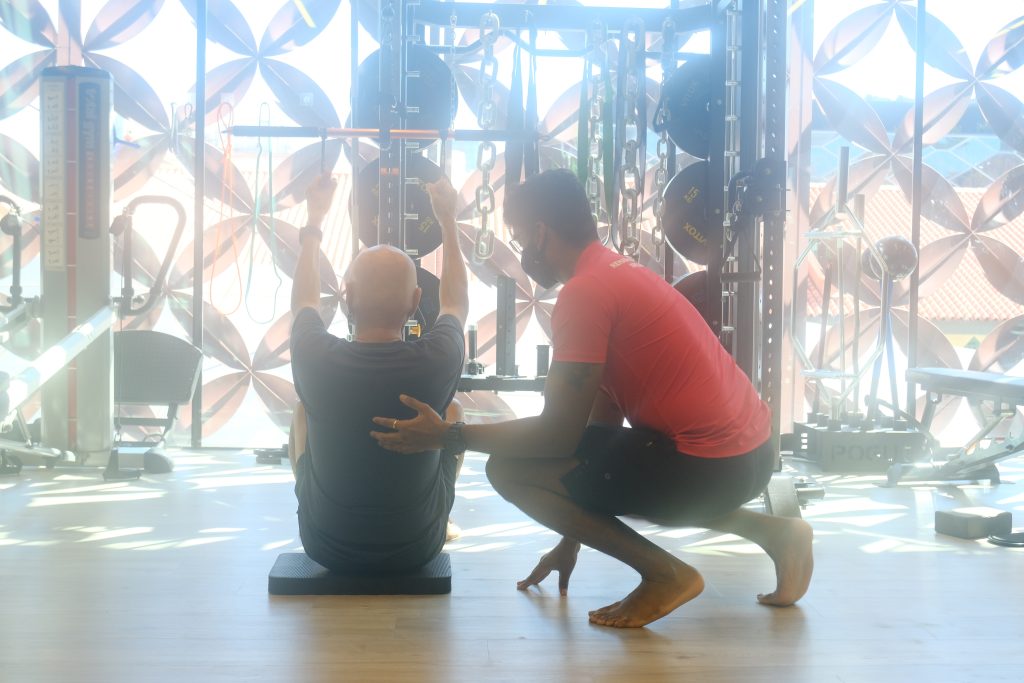14th DIHAC cross-cultural exchange meeting analysis report
Social and Physical Paths to Healthy Ageing: The Lessons We Learnt from the Netherlands and Singapore
14th DIHAC cross-cultural exchange meeting report
Myat Yadana Kyaw, Steven Bunt, Nelson Chong, Nadila Mulati, Myo Nyein Aung, Hans Hobbelen
- Aging in place is increasingly favored in health ageing policies, but it is important to prevent social frailty among community residents.
- Functional training in the view of a coach is healthy lifestyle, ergonomic and posture in addition to the exercise.
After retirement, it is hard to stay socially connected. Those with physical dependence are less likely to be connected and engaged leading to loneliness. The situation is increasingly studied in contemporary research with a term social frailty. Digitally Inclusive Health Ageing Communities (DIHAC) is cross-cultural research addressing digitalization among older people and the pathways to healthy aging. In the 14th cross-cultural meeting of DIHAC, participants learnt from Chairperson and speakers and discussed healthy aging especially in the physical and social domains, in different point of views.
The 14th DIHAC meeting was held on 14th December 2022, chaired by Professor Hans Hobbelen, a professor in health aging research from Hanze University of Applied Sciences Groningen and the president of the International Association of Physiotherapists working with older people. More than 40 participants included multidisciplinary researchers, sociologists, medical doctors, physiotherapists, researchers, and Ph.D. students from Japan, South Korea, Singapore, Thailand, Malaysia, Indonesia, the Netherlands, and the UK attended the meeting. As an opening remark, Prof Hobbelen highlighted that population aging is a global phenomenon and activities promoting healthy aging should address the major domains influencing healthy aging such as physical, mental/cognitive, and social comprehensively.
The first speaker Dr. Steven Bunt, Ph.D. presented about social frailty from a multidimensional perspective. After noticing that two third of older people with physical complaints who visited physiotherapists were frail, Dr. Bunt and the team also found out that although physical frailty is present, older people are even more frail in psychological and social components. In his scoping review [1], social frailty is explained from a perspective of social need (a need for affection, behavior confirmation, and status) based on the social production theory. When people age, the general and social resources change or are lost. People tend to substitute their needs or self-manage resource allocation to achieve social well-being. People with self-managing skills are also found to have higher subjective well-being. Therefore, social frailty is the continuum of having loss or the risk of loss of not only general and social resources but also social behaviors, activities, and self-management abilities that are important for fulfilling basic social needs. In the qualitative study of experiences of social frailty among older people [2], it is interestingly found that loneliness is experienced not only in people living in assisted living but also among community-dwelling seniors. Relating to this finding, participants actively discussed the possible causal factors. Dr. Bunt discussed that the current policy of the Netherlands promotes older people to age in their place, if possible, and move to assisted homes only when they need assistance mainly for physical needs. Some of the older people showed improvement in their well-being when moved to assisted homes showing that physical needs alone should not be a decisive factor for the needs of assisted living. Dr. Bunt also mentioned that physiotherapists provide interventions for older people with physical needs mainly to perform daily social activities and this could be a way for social frailty to be addressed in clinical practice. Participants from Japan exchanged the research findings from Japan Gerontological Evaluation Study (JAGES), reporting that closely knit community ties can prevent social frailty among community residents in Japan. [3] Dr. Bunt also shared validated instrument to measure social frailty.

Figure 1: Screen shot of 14th DIHAC meeting in Zoom being chaired by Professor Hans Hobbelen, speakers and international participants.
In this 14th DIHAC meeting, scientists’ presentation of research and evidence was followed by professional’s presentation based on practical experience.
The second presentation is about functional and physical fitness presented by Mr. Nelson Chong, an R4 coach, CEO, and founder of the Functional Training Institute, in Singapore based on his coaching experiences. Mr. Chong introduced a functional way of anti-aging and pain-free living. He viewed fall among the older persons as preventable by training side walking and backward walking. In the presentation, Mr. Chong emphasized the importance of correct posture in reducing pain caused by malignment and encouraged maintaining proper ergonomics of feet, spine, and body alignment. His experiences revealed that functional training which is the movement solution for bodily dysfunction could solve the pain and lead to a pain-free living. For the older population, functional training involves movements to prevent falls and strengthen their reflexes along with stimulation of visual perception. He explained how squat is important in maintaining the body posture and cultural difference in lifestyles leading to the less use of squatting in daily life. After the details of functional ways to anti-ageing and pain free living, he concluded as ” Exercise is Medicine”. The take-home message from Mr. Chong is to know what and why the movement is being done and train what the body needs first before the heart wants in which empowerment plays a major role. Mr. Chong’s decades long experiences are directing us to seek new research and presentation of evidence about the impact of functional training on healthy ageing in the next meetings.
In addition, he informed that digital technology is powerful help for his clients to sustain the healthy behavior through the accurate measurement such as body composition and also with simple self-assessment using photography.

Figure 2 : A scene at functional training institute in Singapore
To sum up, healthy aging is a process involving physical, mental, and social well-being interactively. Socially frail older people are at risk of physical frailty and vice versa. Therefore, it is important to maintain the physical fitness of the older population as well as social connectivity and inclusiveness through comprehensive policies, programs and innovations. The depth of knowledge and the breadth of cultural diversity in presentations and vibrant discussion are believed to benefit as food for thought and hints for the healthy ageing lifestyles.
There is no conflict of interest to declare.
References:
[1] Bunt, S., et al., Social frailty in older adults: a scoping review. Eur J Ageing, 2017. 14(3): p. 323-334.
[2] Bunt, S., et al., Experiences of social frailty among rural community-dwelling and assisted-living older adults: a qualitative study. Ageing and Society, 2021: p. 1-21.
[3] Noguchi, T.A.-O., et al., Association between community-level social capital and frailty onset among older adults: a multilevel longitudinal study from the Japan Gerontological Evaluation Study (JAGES). (1470-2738 (Electronic)).
Myat Yadana Kyaw, MD is a Ph.D. student at the Department of Global Health Research, Graduate School of Medicine, Juntendo University, Tokyo, Japan.
Steven Bunt, PhD Senior lecturer, researcher, and project leader at Hanze University of Applied Sciences, Groningen, the Netherlands.
Nelson Chong, R4 Coach, CEO & Founder of Functional Training Institute, Singapore
Myo Nyein Aung, MD, MSc, Ph.D. is an Associate Professor at the Department of Global Health Research, Graduate School of Medicine, Juntendo University, Tokyo, Japan.
Nadila Mulati, MSc is a Ph.D. student at the Department of Global Health Research, Graduate School of Medicine, Juntendo University, Tokyo, Japan.
Hans Hobbelen, PhD Professor in Ageing and Allied Healthcare, Hanze University of Applied Sciences, Groningen, the Netherlands.
